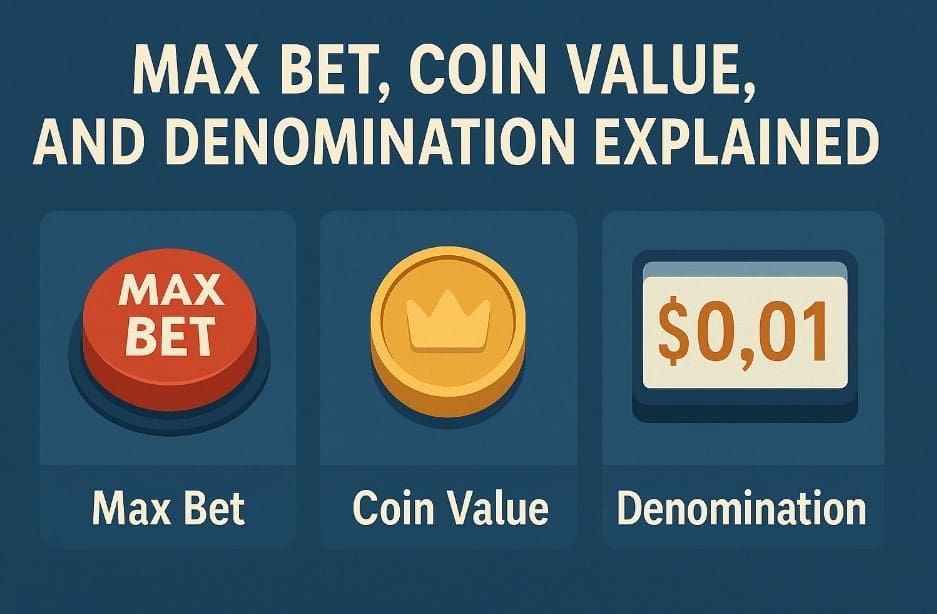Slot machines look straightforward. You put in money, hit spin, and watch the reels. But under the hood, the way bets are structured—things like max bet, coin value, and denomination—decide how much you’re really risking, how long your bankroll lasts, and whether you’re even eligible for certain jackpots. The details matter more than most people think, and honestly, I’ve seen plenty of folks learn that lesson the hard way.
What Does Max Bet Mean in Video Slots?
That little “Max Bet” button might seem like a handy shortcut, but it’s loaded with consequences. Press it, and suddenly you’re playing every payline at the highest coin value the game allows. It feels bold—like pushing all your chips in on a poker hand—but in slots, it doesn’t always mean better odds.
I remember sitting next to a guy in Vegas who swore he always hit max bet because he believed the machine was “hot.” He did a $25 spin, lost, then did another. By the time his drink arrived, he’d blown through $200. The funny thing? On that machine, betting max didn’t actually increase his chances—it just multiplied what he could win if he got lucky. He wasn’t wrong to try, but his expectation didn’t line up with the game’s design.
Classic three-reel machines sometimes required max bet to unlock the jackpot, sure. But on modern video slots—especially online—it’s more about payout size than access. If a payline promises 100x your bet, a $0.50 wager nets you $50, while a $5 max bet makes it $500. Same odds, just higher stakes.
How Coin Value Impacts Your Total Stake
Coin value is sneaky. It looks like a harmless setting buried in the corner of the screen, but it can turn a casual session into an expensive one without you realizing.
A friend of mine once sat down at a penny slot and thought she was betting $0.25 per spin. She didn’t notice the coin value was set to $1, and with 25 lines active, she was dropping $25 per spin. After three spins she muttered, “Why is my credit meter dropping so fast?” By then, $75 was gone. Lesson learned: always peek at the coin value before spinning.
It works both ways, though. Adjusting coin value is a great way to stretch your bankroll. Keeping it low lets you play more spins without cutting paylines, which keeps you in the action longer.
Understanding Slot Denominations: From Penny to High Limit
Denomination is the machine’s “native language.” A penny slot speaks in one-cent credits, a quarter machine in 25-cent credits, and so on. In physical casinos, the denomination is printed right on the machine—easy to spot. Online, it’s just baked into the betting options.
Don’t let the name fool you, though. Penny slots aren’t always cheap. A so-called “1¢ slot” with 50 fixed paylines means your minimum bet is already $0.50. High-limit machines are the other extreme. Sit down at a $5 denomination slot and even the minimum bet can feel like a punch in the gut. I once watched a man light a cigar, pop $100 into a $25 slot, hit spin, and grin when he lost. “Cheaper than golf,” he joked. Not for me, thanks.
Denominations basically separate the casual players from the high-rollers. You’ll find entire crowds camped at penny slots for hours, while the high-limit rooms are quieter, with fewer players but bigger swings.
Bet Level vs Coin Value: Key Differences
Here’s where it gets confusing. Many slots let you adjust both bet level and coin value. Bet level means how many coins you’re placing per payline. Coin value is the worth of each coin. Together, they decide your spin cost.
Take a 20-line slot. You set bet level 2 (two coins per line) and coin value at $0.05. The math: 20 × 2 × $0.05 = $2. Simple once you break it down, but at first glance, it’s like trying to read a foreign menu.
I used to crank the bet level thinking it “increased my chances.” It doesn’t. It just raises the total wager. The only real decision is whether you prefer bigger coin values with lower bet levels or the reverse. It’s a psychological choice more than anything. Slot designers know players like fiddling with settings, so they keep both options.
Payouts and Maximum Bets: What’s at Stake?
Here’s where max bet gets interesting. Some slots lock their best features or jackpots behind it. Miss that, and you’re literally not in the game for the top prize. Progressive slots are notorious for this.
I’ve seen players hit what would have been a million-dollar jackpot—except they weren’t playing max. Instead of life-changing money, they walked away with a nice but much smaller payout. The look on their face said it all. Always check the paytable before you play. If max bet is required for the jackpot, you should either commit or accept you’re only chasing the smaller prizes.
Even outside of jackpots, betting fewer paylines can backfire. Imagine hitting a jackpot combo on a line you didn’t activate. That’s the kind of story people tell with a sigh, not a smile.
Strategies for Managing Your Slot Betting Amounts
Everyone has their own rhythm with slot betting. Some go slow and steady, others swing for the fences. A few practical tips can keep things balanced:
- Set a session budget and stick to it—don’t let emotions run the show.
- Keep paylines active; drop coin value instead if you need to lower cost.
- Use max bet only when it’s required for jackpots or features.
- Ramp up bets if you’re ahead, but never chase losses with bigger wagers.
- Double-check coin value and bet level every time—seriously, machines don’t care if you misclick.
It sounds simple written out, but when the reels are spinning and bonus music is blaring, discipline is harder than it looks.
Max Bet and Progressive Jackpots: When Does It Matter?
Progressive slots are the classic case where max bet matters most. In Las Vegas, Megabucks demands maximum coin play for the jackpot. Online, rules vary: some games scale eligibility based on your wager, others use the all-or-nothing model.
I once met a guy who hit the second-highest jackpot on an online slot. He was thrilled until he realized that with max bet, he would have won ten times as much. He shrugged it off, saying, “At least it bought my vacation.” Fair point, but it stuck with me: if you’re chasing the dream payout, half-measures won’t cut it.
Why Denomination Shapes Session Length

Denomination quietly dictates how long your bankroll lasts. A $200 budget on a penny slot at $0.50 per spin buys around 400 spins—plenty of entertainment. Take that same $200 to a $5 denomination machine with $10 minimum bets, and you’re looking at 20 spins. Blink and it’s over.
Sometimes I switch it up. If I’m killing time, penny slots keep me entertained. If I’m in the mood for adrenaline, I’ll risk a few spins on higher-denomination machines. It’s like the difference between nursing a beer and ordering a round of shots.
Anecdotes from the Casino Floor
The slot floor is full of little stories. I once saw a woman camped on a penny slot for three hours, slowly sipping a cocktail, stretching $50 into an afternoon. Next to her, a guy dropped $500 in a high-limit machine in less than ten minutes. He walked away without a blink. Two completely different approaches, both valid in their own way.
Another time, a tourist next to me hit “spin” without realizing she was on a $5 denomination machine with max bet locked in. That first spin cost $25. She gasped, laughed nervously, and said, “Okay, that’s enough Vegas for me.” She left, probably with a good story for friends back home. It’s moments like that which remind me why paying attention to the settings matters.
The Role of Paytables and Game Design
The paytable is the instruction manual nobody reads. It tells you exactly how payouts work, which bets unlock which features, and whether max bet is required for progressives. Skipping it is like jumping into a board game without glancing at the rules.
Game designers shape paytables to match their audience. Some games give you tons of flexibility, letting you tinker with every parameter. Others strip it down—fixed paylines, fixed coin value, one button to set total bet. Neither style is “better.” But if you don’t read the paytable, you’re playing blind.
FAQs: Max Bet, Coin Value, and Denomination in Slots
Do I always need to play max bet to win big?
Nope. Most video slots scale payouts to your stake. But progressive jackpots often require max bet.
What’s the difference between denomination and coin value?
Denomination is the machine’s base credit size; coin value is the amount you assign per coin.
Is it smarter to lower coin value or reduce paylines?
Lower coin value. Cutting paylines risks missing winning combos.
Why do casinos hype penny slots if payouts are smaller?
Because they keep people playing longer. More spins, more engagement, more revenue for the house.
Can I change denomination mid-game?
Online, yes. In physical casinos, you’d need to cash out and move machines.


